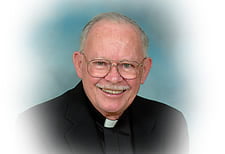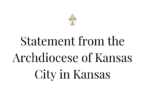by Joe Bollig
joe.bollig@theleaven.org
KANSAS CITY, Kan. — According to official records, Father Philip E. Kendall, CSV, was a priest without a parish — although that’s not quite true.
In all his 48 years as a priest, Father Philip never officially served as a pastor or associate pastor. His primary role was judicial vicar of the archdiocesan tribunal, a post he held for 33 years.
But don’t tell that to parishioners at St. Peter Cathedral in Kansas City, Kan., where he lived for many years and often celebrated Mass. They considered him part of the parish. And don’t tell that to parishioners at Sts. Cyril and Methodius Church, now part of All Saints Parish in Kansas City, Kan. He regularly celebrated Sunday Mass there, and the other sacraments as well.
“They loved him, and he loved them,” said Joan DeBauge, a member of Queen of the Holy Rosary Parish in Overland Park, and retired archdiocesan tribunal secretary.
In his last years, Father Philip would celebrate Mass on Sundays and feast days for the residents of Victory Hills Senior Living Community. The very appreciate residents considered him pastor and dubbed their little quasi-parish “Our Lady of Victory Hills.”
He could have chosen to bury himself in the church bureaucracy, but he didn’t. Father Philip had a pastor’s heart and a pastor’s touch. He cared, he was involved, and the people responded.
“I saw him . . . when he was very weak [before he died] at Providence Place,” said Msgr. Michael Mullen, pastor of St. Patrick Parish in Kansas City, Kan.
“When I told a few people that Father Philip was very sick, their response was, ‘Oh, Father Phil who helped in the tribunal? Father Phil the teacher? Father Phil the chaplain to the Sisters? Father Phil the counselor?’” Msgr. Mullen continued. “It was amazing how quickly each person would talk about a different relationship they had with him, which spoke a lot about how widespread was his priestly influence.”
Father Philip often lent a hand to busy pastors who needed a substitute. He taught courses, especially in church history, all over the archdiocese for the Benedictine Institute for Religious Studies. He gave talks. He counseled the troubled and struggling who sought him out. He was a spiritual advisor. He was a teacher and chaplain to the Sisters, Servants of Mary.
If celebrating the sacraments, touching lives and helping people grow in the faith are what define a pastor, then Father Philip was a pastor.
Father Philip wanted to be a priest since he was a student at St. Philip Neri School on the South Side of Chicago. One day, a priest from the Order of Mary Immaculate came to the house with the papers and a train ticket to a high school seminary in San Antonio. Father Philip’s mother literally chased the visitor out of the house, saying, “He’s too young! I’m not finished with him!” The Christian Brothers of Ireland, who taught at his high school, wanted him, too. Eventually, however, he joined another teaching order, the Clerics of St. Viator.
Father Philip considered himself a teacher, even in his tribunal work, as he wrote in a short, undated biography for his file. He was being groomed to teach science at a Viatorian high school when he was sent to The Catholic University of America in Washington, D.C., to study canon law. This sent him down the path that led to the archdiocesan tribunal.
It just so happened that Father Philip was spending the summer in Topeka with his aging parents when the need for a judicial vicar arose. The Second Vatican Council had brought in a host of reforms to meet the challenge of a rapidly changing world.
Before the council, the American canon law society was more of a “chowder and drinking society,” Father Philip said in a 2005 interview.
In 1970, younger priests like himself remade it into a serious, professional society.
When Father Philip took charge in 1972, he took the sleepy, one-horse archdiocesan tribunal into the modern age under the new American Procedural Norms. In 1995, he computerized the office and shortened the time people had to wait for marriage annulments from two years to nine months.
“There were very few functioning tribunals in the whole state of Kansas when I got here,” Father Philip said in a 2005 Leaven article. “Since this is the metropolitan tribunal, it was really important that we had a functioning tribunal.”
Lucia Davis, a member of St. Casimir Parish in Leavenworth, worked with Father Philip in the tribunal from 2002 to 2005.
“He was very, very kind to everyone,” said Davis. “He always treated everyone with compassion, both the petitioners and their former spouses. He insisted that his tribunal be run that way.”
To Father Philip, the tribunal was a place of mercy, a forum of reconciliation, and an instrument of healing, he said in a 2005 Leaven article. He also insisted on competence and following the law.
“It’s like I told them many times over the phone, ‘Hey, I didn’t make up these laws personally to attack you,’” said Father Philip in the article.
“These are the laws I am required to administer by the laws of the church; otherwise, it’s just a game.”
Father Philip had many sayings about tribunal work, one of them being: Compassion without competence is a cruel hoax; competence without compassion is a bitter seed.
Father Philip was a compassionate counselor and advisor, too.
“He was very accepting of everyone,” said longtime friend Cece Muder, a member of Holy Angels Parish in Basehor. “He didn’t care what you wore to church or what social class you were from. He didn’t care. You were a person, and he treated you with respect. I saw him treat everyone with respect.”
As the son of a railroading father, Father Philip had a great love of trains. He built a great big train set with all sorts of miniature buildings and countryside, and with multiple tracks. When he retired and could no longer keep them, he broke it up into smaller “dioramas” and gave them to a doctor friend, so they could be given to sick children.
Father Philip also loved to teach. He taught laypeople as well as women religious.
“Phil was very much a teacher,” said Msgr. Gary Applegate, current archdiocesan judicial vicar. “He taught at a Viatorian high school. He liked it very much, and continued with that [educational] model through his entire life. When he retired, he had boxes and boxes of outlines and notes for different courses.”
Father Philip had a special affection for the Sisters, Servants of Mary, a nursing order.
“He was our chaplain for many years,” said Mother Claudia Rodriguez, SM. “He was a holy priest, a perfect chaplain. He was also very faithful.
And he really showed he loved the Sisters very much. He taught the junior Sisters in formation: church history, canon law, and many subjects for many years.”
And the Sisters reciprocated their love and took care of him over the years as he faced various chronic illnesses.
He always said that he wanted to die surrounded by the Sisters, and they gathered around his bed near the end to pray the rosary and sing hymns, said Mother Claudia. Most of the Sisters had to leave, but one Sister was there to care and pray for him when he entered eternity.







